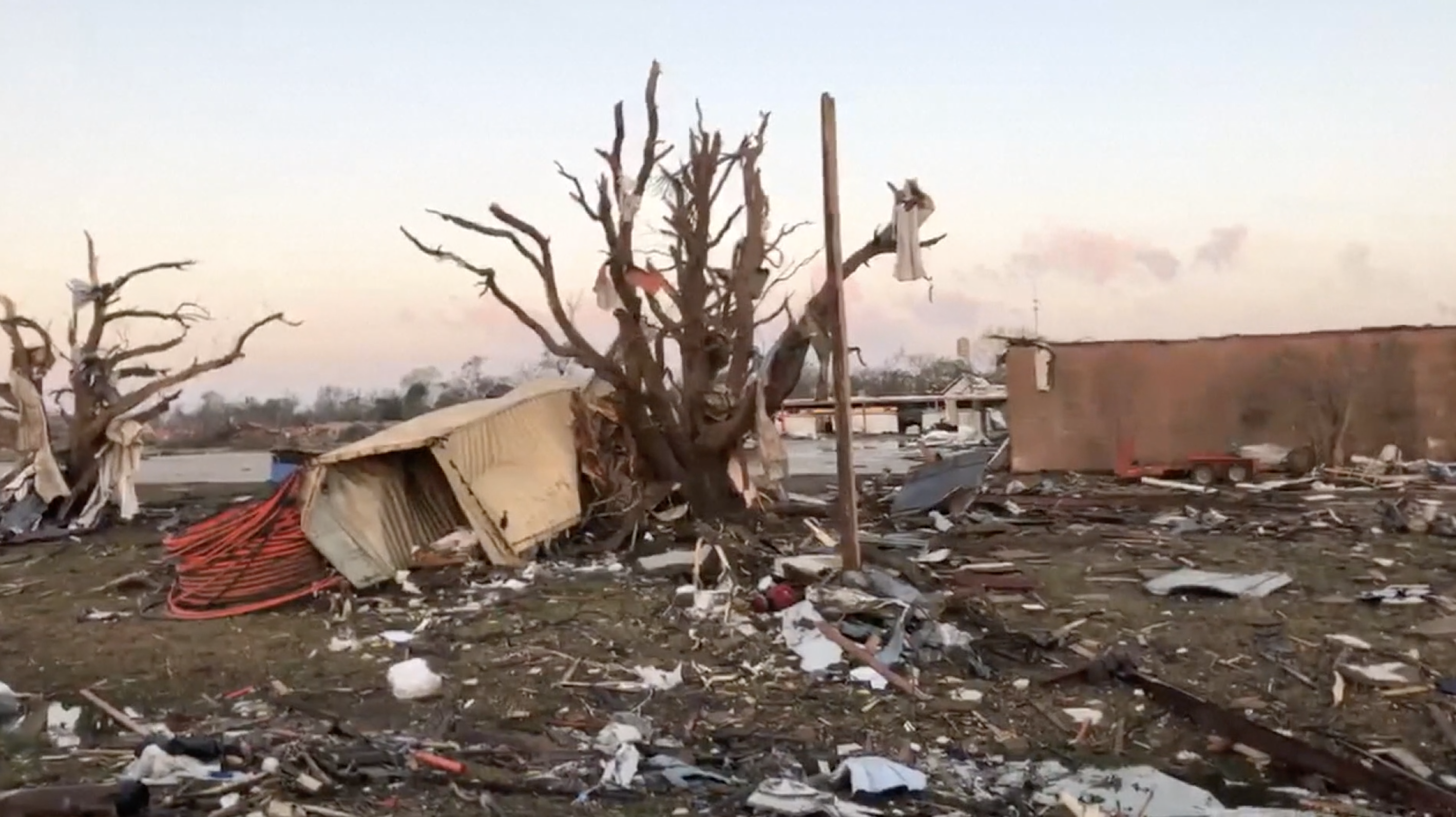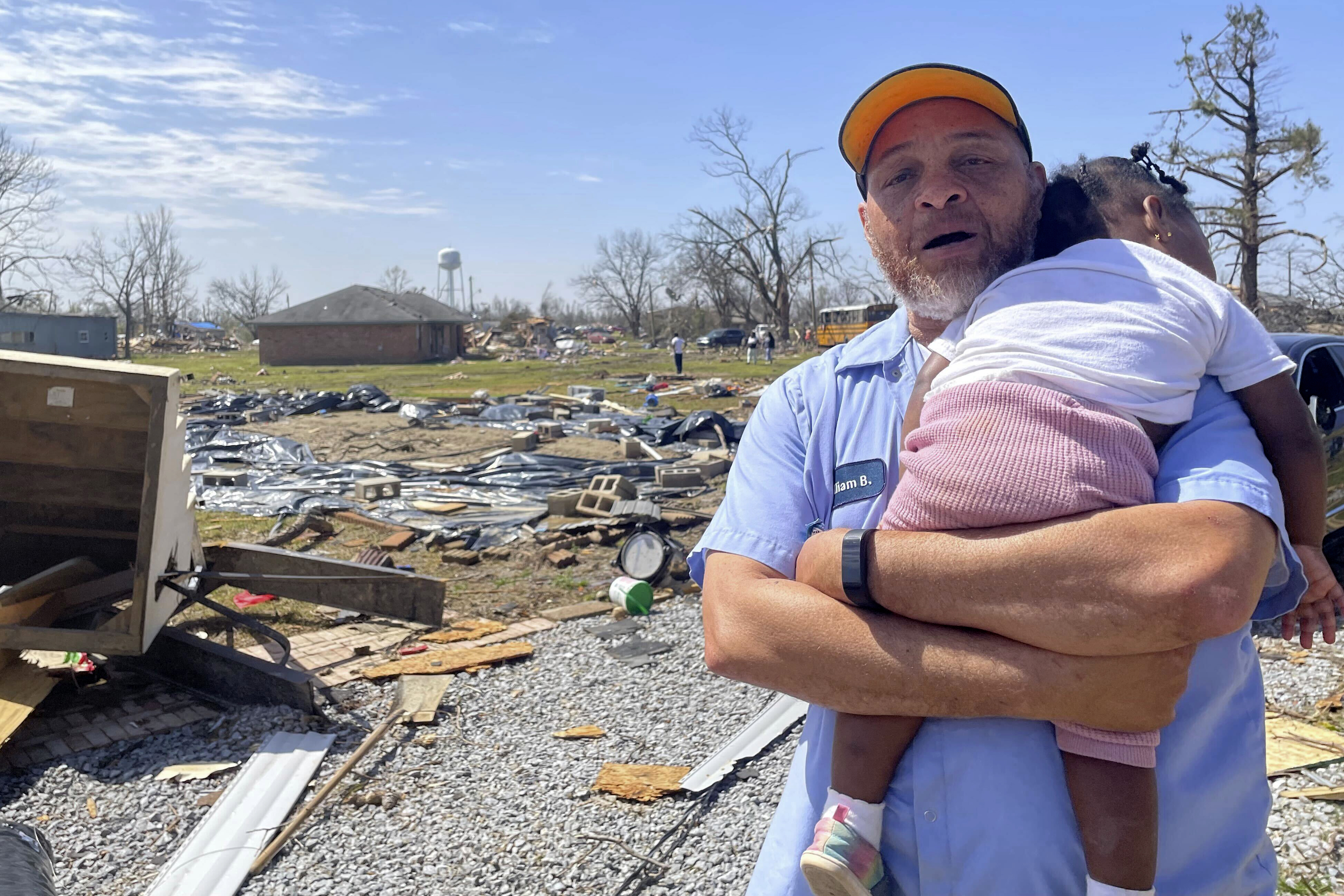Help began pouring into one of the poorest regions of the U.S. after a deadly tornado tore a path of destruction for more than an hour across a long swath of Mississippi, even as furious new storms Sunday struck across the Deep South.
At least 26 people were killed and dozens of others were injured in Mississippi as the massive storm ripped through more than a half-dozen towns late Friday. A man was also killed in Alabama after his trailer home flipped over several times.
“Everything I can see is in some state of destruction,” said Jarrod Kunze, who drove to the hard-hit Mississippi town of Rolling Fork from his home in Alabama, ready to help “in whatever capacity I’m needed.”
Kunze was among volunteers working Sunday at a staging area, where bottled water and other supplies were being readied for distribution.
Get Boston local news, weather forecasts, lifestyle and entertainment stories to your inbox. Sign up for NBC Boston’s newsletters.
Search and recovery crews resumed the daunting task of digging through flattened and battered homes, commercial buildings and municipal offices after hundreds of people were displaced.
The storm hit so quickly that the sheriff's department in Rolling Fork barely had time to set off sirens to warn the community of 2,000 residents, said Mayor Eldridge Walker.
“And by the time they initiated the siren, the storm had hit and it tore down the siren that’s located right over here," Walker said, referring to an area just blocks from downtown.
Read More
The mayor said his town was devastated.
“Sharkey County, Mississippi, is one of the poorest counties in the state of Mississippi, but we’re still resilient,” he said. “We’ve got a long way to go, and we certainly thank everybody for their prayers and for anything they will do or can do for this community.”
President Joe Biden issued an emergency declaration for Mississippi early Sunday, making federal funding available to hardest hit areas.
“Help is on the way,” Mississippi Gov. Tate Reeves said at a news conference with local, state and federal leaders.
Recovery efforts in Mississippi were underway even as the National Weather Service warned of a new risk of more severe weather Sunday — including high winds, large hail and possible tornadoes in Georgia, Louisiana, Mississippi and Alabama.
A tornado touched down early Sunday in Troup County, Georgia, near the Alabama border, according to the Georgia Mutual Aid Group. Affected areas included the county seat of LaGrange, about 67 miles (108 kilometers) southwest of Atlanta
About 100 buildings were damaged, with at least 30 uninhabitable, and five people suffered minor injuries, officials said. Many roads, including Interstate Highway 85, were blocked by debris.
Two tigers briefly escaped from their enclosures at Wild Animal Safari in Pine Mountain, Georgia, after the park sustained extensive tornado damage. “Both have now been found, tranquilized, and safely returned to a secure enclosure,” the park said on Facebook. None of its employees or animals were hurt, it said.
Outside of Rolling Fork, a tornado ripped apart the home where Kimberly Berry lived in the Delta flatlands. The twister left only a foundation and a few belongings — a toppled refrigerator, a dresser and nightstand, a bag of Christmas decorations, some clothing.
Berry said she and her 12-year-old daughter huddled and prayed inside a nearby church as the storm roared outside.
“I didn’t hear nothing but my own self praying and God answering my prayer. I mean, I can get another house, another furniture. But literally saving my life — I’m thankful,” she said.
Following Biden’s declaration, federal funding will be available for recovery efforts in Mississippi’s Carroll, Humphreys, Monroe and Sharkey counties, including temporary housing, home repairs, loans covering uninsured property losses and other individual and business programs, the White House said in a statement.
The twister flattened entire blocks, obliterated houses, ripped a steeple off a church and toppled a municipal water tower.
Based on early data, the tornado received a preliminary EF-4 rating, the National Weather Service office in Jackson said in a tweet. An EF-4 tornado has top wind gusts between 166 mph and 200 mph (265 kph and 320 kph).
In Rolling Fork, the tornado reduced homes to piles of rubble and flipped cars on their sides. Other parts of the Deep South were digging out from damage caused by other suspected twisters.
The Federal Emergency Management Agency said 25 people were confirmed killed in Mississippi, 55 people were injured and 2,000 homes were damaged or destroyed. High winds, hail and strong storms were expected for parts of Alabama and Georgia on Sunday, the National Weather Service said.
The tornado that slammed into Rolling Fork tore across Mississippi for about 59 miles (95 kilometers) over a period that lasted more than one hour, the National Weather Service said in a preliminary report Sunday. The tornado was an estimated three-quarters of a mile wide at some points, according to the preliminary estimate.
The supercell that produced the deadly twister also appeared to produce tornadoes causing damage in northwest and north-central Alabama, said Brian Squitieri, a severe storms forecaster with the weather service's Storm Prediction Center in Norman, Oklahoma.
In Georgia, Rachel McMahon awoke Sunday to news from her father that the Troup County motel he’d been staying in was destroyed. She said her dad, who is disabled, took shelter in the bathtub when the tornado hit.
He was badly shaken up, but not injured. She had to walk the last half-mile to his motel because of downed trees.
“SO thankful my dad is ok,” she posted on Facebook, along with photos and videos of the damage: houses with gaping holes in roofs, massive tree trunks snapped in half and powerlines dangling every which way.
___
Associated Press journalists Leah Willingham in Charleston, West Virginia; Jim Salter in O’Fallon, Missouri; Lea Skene in Baltimore; Jeff Martin in Woodstock, Georgia; Christopher Weber in Los Angeles, and Nicole Winfield in Rome contributed to this report.



